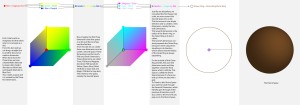In Seventh the Mind has a central part. It has not only one part but several parts to play but most importantly it lies at the foundation of Seventh. For it does come from our imagination.
In any case I would like to pay tribute to the mind in this case. Your mind, my mind and our mind. In Seventh the mind is just another dimension, a dimension just like length and width. There has so far only been two players who has experienced a lecture in the game about how this works and I have made a post about how it is possible, a priori, for those dimensions to exist. I am not going to give that in-game lecture here, I will merely touch on it. But enough introduction to what I want to say, please read on.
Focus and start imagine a Dot. It can be of any colour and of any size. Now keep this Dot in your imagination but I also want you to imagine a second Dot, make it the same as the first Dot. Without you knowing it you have now created a dimension and I will come back to the Why of that, hopefully, later. If you now draw a line between the first and the second dot you will have in your imagination created an image of a dimension. It has no thickness and it has no depth, it only has a length.
Is the line in your mind now visible to you? Can you see it in there? If I told you that it is impossible for you to see it would you then believe me and would the fact that you absolutely can see the line in your mind tell you that it is possible? This is where the Mind will show that it is absolutely a fantastic device that breaks the boundaries of reality. Please read on.
The reason why it is impossible for you to see the line that you drew between the two Dots you imagined is because the line has no thickness and it has no depth. Look at the screen in front of you. It has a width, it has a height and it has a deapth. If you start taking away one of these at the time you will end up with just one. So start taking away the deapth of your screen. Would it be possible for you to see it if the screen only had a width and a height? No, it would not because without the depth there is no way there is room for substance. This is the limitation of the Real world. Everything is made of three dimensions and if you take away one of the dimensions, like depth for example, it is not possible for any substance to fit in just two dimensions. If you have followed this far, please read on.
So how is it possible that you are able to imagine just one line, one dimension? Is your mind able to “see” things that are not physically possible to experience? Or is it so that when you imagine something that you, without having to think of it, are always imagining in three dimensions? No matter what the answer is to those questions, it is clear that you are able to imagine it. You are able to imagine the shape of the line that in principle is the same as one dimension, and you are also able to imagine the meaning of this whole concept, and this is something that can not be found through empirical experience, it can only be found in your mind, your imagination.
With all this in mind it becomes quite clear that anything should be possible in our imagination and this is a powerful thing. It is so powerful that we can create alternative worlds within our minds and we can make things happen in that alternative world and it is completely directly unaffected by the real world.
With this I meant to make a tribute to our minds, as they are, and hopefully inspire thinking and imagination and make it a respected and a truly enjoyable place to be in.


